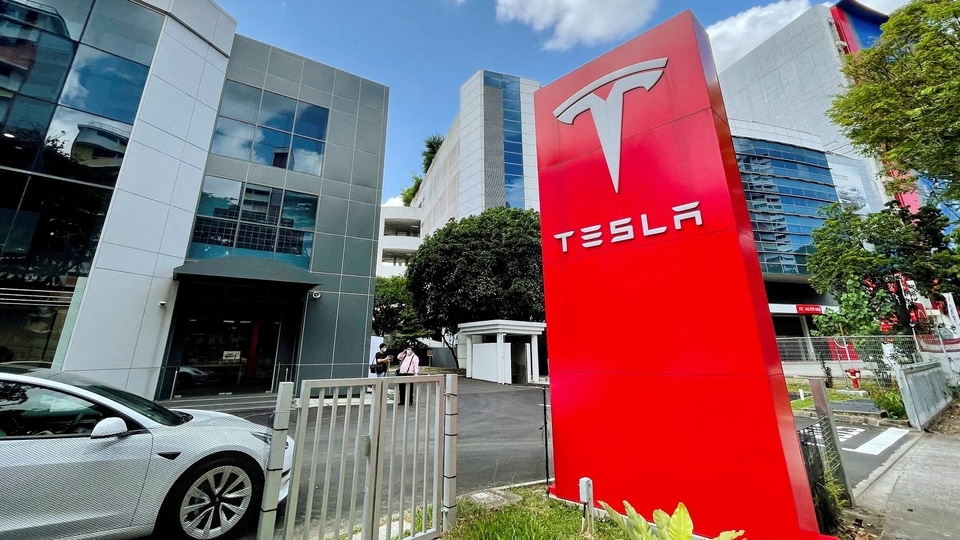Morgan Stanley Sees Dojo Boosting Tesla’s Value by $500 Billion
Tesla Inc.’s Dojo supercomputer may add as much as $500 billion to the company’s market value through faster adoption of robotaxis and network services, according to Morgan Stanley.

Tesla Inc.'s Dojo supercomputer may add as much as $500 billion to the company's market value through faster adoption of robotaxis and network services, according to Morgan Stanley.
Dojo can open up “new addressable markets,” just like AWS did for Amazon.com Inc., analysts led by Adam Jonas wrote in a note, upgrading the stock to overweight from equal-weight and raising its 12-month price target to a Street-high $400 per share from $250.
Shares of Tesla, which have already more than doubled this year, rose as much as 8% Monday. The stock was on track to add about $62 billion in market value. Morgan Stanley is one of Musk's key advisory firms, including on the $44 billion takeover of Twitter Inc., now known as X.
The supercomputer, designed to handle massive amounts of data in training driving systems, may put Tesla at “an asymmetric advantage” in a market potentially worth $10 trillion, said Jonas, and could make software and services the biggest value driver for Tesla from here onward.
The next version of Tesla's full self-driving system, expected by year-end, and the company's potential Artificial Intelligence Day in 2024 are worth watching, he added. Tesla has not formally announced an AI Day for next year.
As of last close, Tesla's stock price was down about 4.2% since Jonas cut his recommendation to neutral in June, compared with a 2.1% gain in the S&P 500 Index and 2.8% rise in the Nasdaq 100 Index over that time.
Jonas has previously made dramatic changes to his outlook for Tesla shares based on bullish predictions about the company's autonomous-driving capabilities, which have yet to materialize.
In August 2015, he hiked his price target for the shares by 66% based on his view that Tesla would launch an app-based on-demand mobility service to compete with the likes of Uber Technologies Inc. and Lyft Inc. Eight years later, Tesla has yet to introduce such a service, and features the company markets as Autopilot and Full Self-Driving require constant driver supervision.
Tesla has been mentioning how Dojo gives it an edge in AI and self-driving technology since at least 2021. In July this year, CEO Elon Musk told investors that the carmaker plans to invest more than $1 billion on the project by the end of 2024.
“As a point of reference, in 2022, Nvidia spent $7 billion across the entire company on research and development,” Gene Munster, co-founder and managing partner at Deepwater Asset Management, wrote in a note in July. “In other words, spending $1 billion plus on a single product is aggressive and speaks to Musk's urgency at making good on this FSD prediction.”
Meanwhile, that base-case target from Morgan Stanley would put the stock near its record close of $409.97 in November 2021. That makes the firm a notable outlier: The average price target among analysts tracked by Bloomberg is $268.42.
“The more we looked at Dojo, the more we realized the potential for underappreciated value in the stock,” Jonas said.
While most other analysts have still to outline Dojo's impact on the company, Seth Goldstein of Morningstar Research Services LLC says that, “while it's good for Elon to push the team to go as quickly as possible, in reality Tesla usually sees a delay from Elon's original timelines.”
“It doesn't mean they aren't making progress,” Goldstein said in a phone interview Monday. “Once Dojo is up and running and takes over the software training, it will allow Tesla to update software more quickly and increase subscriptions at software margins, which can be a big value driver.”
Catch all the Latest Tech News, Mobile News, Laptop News, Gaming news, Wearables News , How To News, also keep up with us on Whatsapp channel,Twitter, Facebook, Google News, and Instagram. For our latest videos, subscribe to our YouTube channel.

























